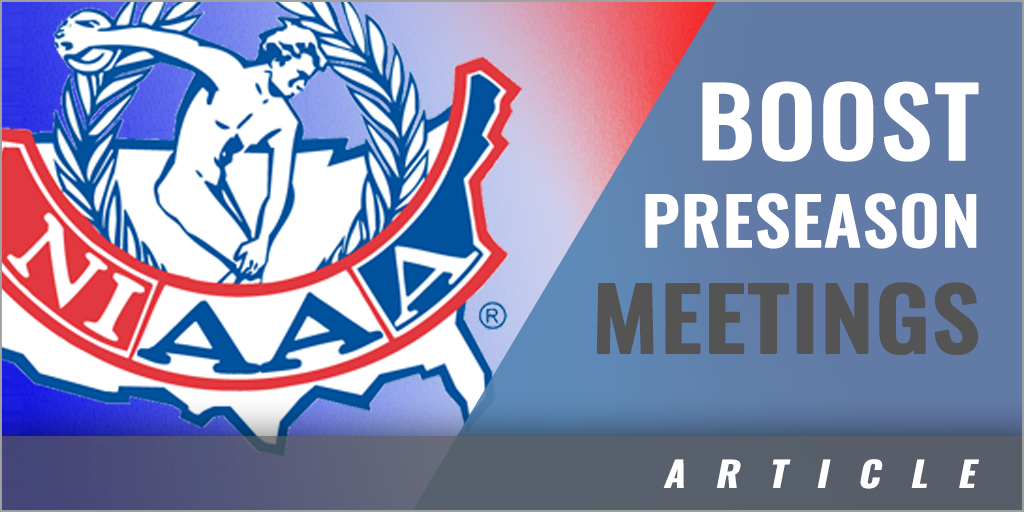|
By: Jonathan Winer, CMAA - CREC Academy of Aerospace and Engineering High School (CT) The importance of the preseason coaches meeting can easily be lost or overlooked in the hectic nature of the start of a new season. Coaches may view it as an obstacle that takes time away from their important preparations. However, if structured correctly, the preseason coaches meeting can become something coaches look forward to. Below are some ideas that have improved preseason coaches meetings in our district and can be replicated anywhere. Start with Food We all know that providing food is a great way to welcome people to an event. The preseason coaches meeting is no different. Providing something simple like pizza and soda is a great and easy way to show your appreciation of the coaches. We know our time with coaches is limited, so we often want to get right into the content of the meeting. As a result, this can prevent coaches from having the opportunity to connect with colleagues they may not have seen for months. Reserving ten minutes at the beginning of each meeting to eat food and engage in light dialogue, allowing colleagues to catch up with each other is time well spent. If circumstances allow, consider sending attendees the menu beforehand and give them the opportunity to select their own meal. Coaches will appreciate your effort. Include an Icebreaker Icebreakers can sometimes be perceived as wasted time, but if done well, icebreakers can provide coaches with the opportunity to engage in a fun activity that helps to build a community in which they feel more comfortable with each other. Here are some examples of effective icebreakers we have used in our district:
Raffle Giveaways One idea that has been a “homerun” for our district is having raffle giveaways on hand for the meeting. Many local businesses are more than willing to donate a gift card once they are informed of the time commitments coaches make, the monetary compensation they receive, and the increased difficulty of filling positions due to the smaller pools of applicants. In addition to local businesses, you can reach out to local professional sports organizations. We have had success receiving donated tickets to upcoming games, opportunities to throw out the first pitch, and fan packs that include gear and memorabilia. Local colleges are also often willing to donate tickets and gear. To keep coaches engaged throughout the meeting, they can earn raffle tickets for participating in group discussions. Hold the raffle at the end of the meeting to ensure no one leaves early! If you can, be sure to follow up with a handwritten thank you note and a T-shirt to those businesses who donated. This demonstrates your appreciation and increases the possibility they will continue to support your program with donations in the future. Hold a Separate Meeting for First Year Coaches In our district, many coaches work multiple seasons. As a result, they are often sitting through three preseason coaches meetings each year. Add the fact that some coaches have been working in our district for more than 10 years and that amounts to a lot of preseason coaches meetings! Requiring coaches to sit through meetings in which the same information is presented each season creates an atmosphere of resentment. Coaches begin to dread the meetings and develop a belief that their time is not valued. Therefore, it is a good idea to hold a separate meeting for coaches who are new to your district. During this meeting, you can go over all the logistical items that returning coaches are to be already familiar with, such as transportation, online registration, the certification process, communication expectations, etc. This meeting can be held virtually and should be recorded so that it is available for coaches to refer back to during the season. The recording can also be used to onboard any late hires. Bring in a Guest Speaker A major component of our preseason coaches meeting is a focus on philosophy, culture, and core values. We want our coaches to reflect on why they are coaching. We also ask that they adopt an education-based athletics philosophy in which athletics are an extension of the classroom, where students learn life lessons and develop skills that help them do well in school and in life. With many repeat coaches in our district, it is important they don’t only hear repeatedly from me about our philosophy and core values. Bringing in a guest speaker to support and supplement these messages can be a meaningful alternative. It confirms that other leaders share your foundational beliefs, even if their content or approach differs. Another voice echoing a message similar to yours can be more powerful for your coaches. And with the prevalence and improved effectiveness of virtual presentations, you are not limited to speakers who live in your community; anyone, anywhere is now accessible! When identifying individuals to speak to your coaches, it is critical you conduct your due diligence to ensure you know their approach and messaging and that they are a good fit for your organization. If possible, ask them to send you their slides ahead of time so you can review them and provide feedback if needed. Utilize Scenarios to Reflect Points of Emphasis At the beginning of each season, it is important to reflect on the major issues that arose during the previous season. Addressing them in the preseason meeting helps to prevent the issue from recurring, and scenarios are a meaningful way to do this. For example, one season we had an issue with coaches correctly following concussion protocol. Rather than simply presenting our usual concussion protocol slide, I added a detailed scenario in which coaches were asked to reflect on the action steps they would take when a student-athlete suffers a blow to the head. Coaches then discussed those actions steps with each other and presented them out to the full group. By the end of the activity, I was confident the coaches were better prepared to successfully handle situations in which there was a possible concussion. Scenarios can be used to engage coaches in a wide range of discussions inspired by real challenges, including how to confront unsportsmanlike conduct, how to protect student-athletes in a hostile environment, and much more. Allow Time for Coaches to Meet in Groups and Share Ideas Allot time at the end of the meeting for coaches to meet and lead their own small group discussions on topics important to them. Other coaches can often be the best resource for ideas and suggestions to enhance their craft. Encourage coaches to bring one or two issues they anticipate having during the upcoming season and allow them time to present these potential problems to their peers for feedback. They can serve as a sounding board for one another as the issues they are facing often transcend the sport they coach. Utilize a Post-Meeting Survey Following the meeting, send the coaches a short survey requesting feedback on what they liked about the meeting and what they would have changed. This is a simple way to see your blind spots and continue to improve future meetings. When implemented in follow-up meetings, it also demonstrates to coaches you value their input. The preseason coaches meeting sets the tone for the upcoming season. Structuring it in a way that builds community as well as prepares coaches for challenges demonstrates your appreciation and communicates to them their time is valued. Often, this will leave them excited and prepared for the season ahead. |






